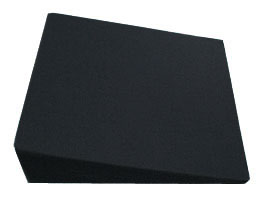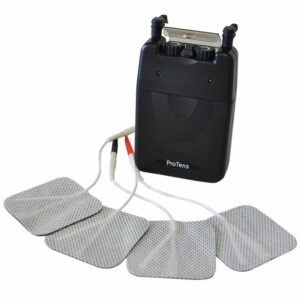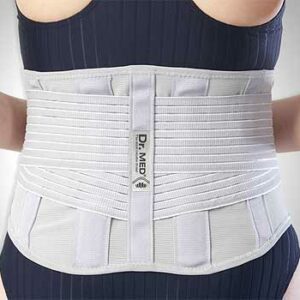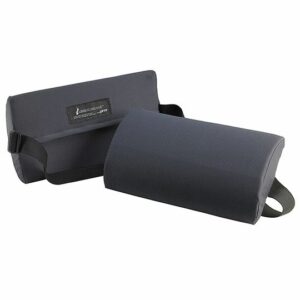Sciatica
Updated:
(Also known as Sciatic Pain, Pinched Sciatic Nerve, Acute Nerve Root Compression)
What is sciatica?
Sciatica is the term given to symptoms experienced from compression or irritation of the sciatic nerve (figure 1). Symptoms usually include one-sided lower back pain which radiates into the buttock and/or leg and sometimes includes muscle spasm, pins and needles, numbness, a burning sensation, shooting pain or weakness. Symptoms may also be experienced in the foot or toes. Although symptoms typically affect only one side of the body, occasionally both sides may be affected.
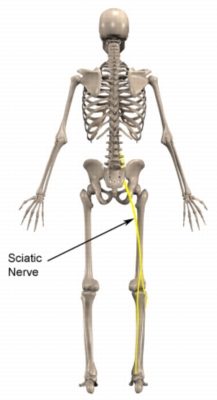
Whilst sciatica is a common complaint, the term itself is often misunderstood. It is important to realize that sciatica is not a diagnosis, but rather a description of symptoms. There are a number of conditions which can cause compression or irritation to the sciatic nerve resulting in sciatic pain. This is important to understand as appropriate treatment for each of these conditions differs.
Causes of sciatica
One of the most common causes of sciatic pain is a lumbar disc bulge. Lumbar disc bulges frequently occur due to excessive sitting, bending or lifting activities and may occur traumatically or due to repetitive or prolonged forces. In the older patient, sciatic pain may be associated with bony compression of the nerve root caused by spinal degeneration or spinal canal stenosis. These conditions typically occur due to gradual wear and tear over long periods of time and are frequently associated with overuse.
Some of the more common conditions which may cause sciatic pain include:
- Lumbar Disc Bulge
- Spinal Degeneration
- Spinal Canal Stenosis
- Spondylolisthesis
- Piriformis Syndrome
- Sacroiliac Joint Dysfunction
- Facet Joint Sprain
Other less common conditions which may also cause sciatic pain include:
- tumors
- bony growths
- infections
Diagnosis of sciatica
A thorough subjective and objective examination from a physiotherapist is usually sufficient to diagnose sciatic pain and the underlying cause of symptoms. Investigations such as an X-ray, MRI or CT scan may be required to confirm diagnosis, assess the severity of injury and rule out other pathology.
Treatment for sciatica

Members Only ContentBecome a PhysioAdvisor Member to gain full access to this exclusive content. For more details see Become a Member. Already a member? Login Now
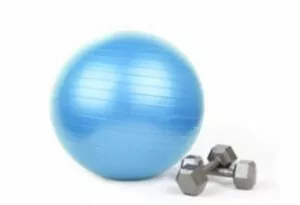 Physiotherapy products for sciatica
Physiotherapy products for sciatica
Some of the most commonly recommended products by physiotherapists to hasten healing and speed recovery in patients with this condition include:
To purchase physiotherapy products to assist with sciatic pain, click on one of the above links or visit the PhysioAdvisor Shop.
 Find a Physio
Find a Physio
Find a physiotherapist in your local area who can diagnose and treat the cause of sciatic pain.
 Lower Back Exercises
Lower Back Exercises
- Basic Pilates Exercises (designed to improve your posture and core stability).
- Cardiovascular Exercise.
- Core Stability Exercises.
 Recommended Reading
Recommended Reading
- When to use Ice or Heat
- Initial Injury Management & the R.I.C.E. Regime.
- Safe Lifting
- Ergonomic Computer Setup
- Back Taping Techniques
- Back Braces
- Correct Posture
- Lower Back Pain Diagnosis Guide
Become a PhysioAdvisor Member
-
 Individual Membership (12 Months)$59.95 for 1 year
Individual Membership (12 Months)$59.95 for 1 year -
 Individual Membership (3 Months)$39.95 for 3 months
Individual Membership (3 Months)$39.95 for 3 months -
 Individual Membership (Yearly)$49.95 / year
Individual Membership (Yearly)$49.95 / year -
 Individual Membership (Monthly)$15.95 / month
Individual Membership (Monthly)$15.95 / month

Link to this Page
If you would like to link to this article on your website, simply copy the code below and add it to your page:
<a href="https://physioadvisor.com.au/injuries/lower-back/sciatica”>Sciatica – PhysioAdvisor.com</a><br/>PhysioAdvisor offers detailed physiotherapy information on a pinched sciatic nerve and sciatica including: symptoms, causes, diagnosis, treatment, physiotherapy products and more...
Return to the top of Sciatica.

